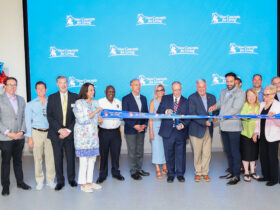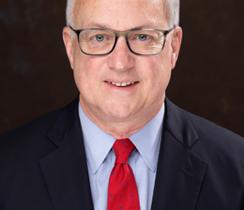Eligible patients now have the option to schedule a telehealth shared decision-making visit as part of their comprehensive screening.
Lung cancer is the most common cause of cancer death in the United States. If you are a current or former smoker, lung cancer screening increases the chance of finding lung cancer early, when it is most treatable.
But although lung cancer screening may lead to early detection of cancerous tumors, only 3% of eligible Bergen County residents access this potentially lifesaving service.
Hackensack University Medical Center offers a comprehensive Lung Cancer Screening Program that connects eligible patients with the preventive lung care they need. To make lung cancer screening even more convenient, the hospital now offers an option to schedule a telehealth shared decision-making visit with a Hackensack University Medical Center nurse practitioner – that can be done from the comfort of their own homes.
“We want to make it as easy as possible for patients to get preventive lung cancer screenings,” said Emilija Bitinaityte, RN, BSN, Lung Cancer Screening Program Coordinator. “Our team handles all aspects of lung cancer screening for our patients — including scheduling, shared decision-making telehealth visits, preauthorization, billing, communicating results to the referring physician and reminders for follow-up care.”
Here’s what you need to know about lung cancer screening at Hackensack University Medical Center:
Eligibility for lung cancer screening
The Annals of Internal Medicine and the U.S. Preventive Services Task Force currently recommend lung cancer screening for patients who:
- Are current smokers or former smokers who have quit in the last 15 years;
- Are between the ages of 55 and 80 years old;
- Have no symptoms of lung cancer; and
- Have at least a 30-pack-year smoking history, such as two packs per day for 15 years, or one pack a day for 30 years.
Lung cancer screening is covered by all private health insurance plans and Medicare for eligible patients. Patients without insurance can receive lung cancer screening at Hackensack University Medical Center at a discounted rate.
Early detection, peace of mind
Lung cancer may not cause noticeable symptoms until it is advanced and has spread to other areas of the body. Common symptoms of lung cancer include:
- A cough that does not go away or worsens
- Coughing up blood
- Chest pain
- Hoarseness
- Fatigue
- Unexplained weight loss
- Wheezing
- Shortness of breath
- Chronic lung infections, such as bronchitis or pneumonia, that keep coming back or do not go away
The most significant benefit of lung cancer screening is the ability to find lung tumors in their early stages, before they cause symptoms and when they are easier to treat.
Other benefits of lung cancer screening include:
- More treatment options
- Less invasive surgery
- A better chance of survival
- Peace of mind
“If you are experiencing lung cancer symptoms, it’s important to see your healthcare provider right away,” said Nabil Pierre Rizk, M.D., MPH, MS, Chief of Thoracic Surgery, Hackensack Meridian Hackensack University Medical Center and Co-Director of Thoracic Oncology, John Theurer Cancer Center. “However, our goal is to connect at-risk patients with lung cancer screening so we can identify problems before symptoms develop.”
How to start the process
If you are a current or former smoker and have questions about lung cancer screening, just call Hackensack University Medical Center’s Lung Cancer Screening Program at (551) 996-3384 or visit Hackensackumc.org/lungcancerscreeening. A team member will answer your questions and complete a phone screening to determine if you are eligible for the program.
If you are eligible, you can complete a convenient shared decision-making telehealth visit with a Hackensack University Medical Center nurse practitioner. Or, you can schedule a shared decision-making visit with your referring provider.
“We understand that patients are busy, so we wanted to offer a flexible telehealth option that allows them to do their shared decision-making visit from home, work, or on the go,” said Bitinaityte. “Although we will still provide the patient’s screening results to their primary care provider, patients who choose the telehealth option no longer have to schedule an in-person primary care visit before their lung cancer screening.”
Scheduling your screening
After the shared decision-making visit is complete, the next step is to schedule the imaging that screens for lung cancer.
“Lung cancer screening is performed using a safe, low-dose CT scan that takes approximately one minute,” said Dr. Rizk. “Low-dose CT uses only a fraction of the radiation of a standard CT scan.”
A Lung Cancer Screening CT scan is a painless imaging procedure that uses special x-ray technology to take many pictures of your body, providing detailed images of your lungs.
“It’s not necessary to avoid eating or drinking before the test, and you will not receive any medications or injections,” said Bitinaityte. “It’s painless, simple, takes only a few minutes, and you can resume your normal activities immediately afterward.”
Results, recommendations and follow-up
The Hackensack University Medical Center team will provide your lung cancer screening results to your referring physician. Your physician will contact you with your results and provide recommendations for follow-up care.
“If you need further care, the pulmonary medicine, medical oncology and thoracic surgery experts at Hackensack University Medical Center can provide the treatment you need — including the latest, evidence-based therapies and access to clinical trials,” said Dr. Rizk.
The Lung Cancer Screening Team will also provide scheduling reminders for future scans if patients require long-term follow-up.
Smoking cessation services
One of the best things you can do to prevent lung cancer is to quit smoking — and it is never too late!
Hackensack University Medical Center has a smoking cessation program that offers free smoking cessation counseling and free nicotine replacement.
All participants in the Lung Cancer Screening Program will receive access to a telephone quitline, as well as web, print and text-based educational materials. You may also opt to participate in up to six brief telephone counseling sessions to help you quit.
Do not put your health on hold
During the pandemic, some patients have been postponing preventive care — sometimes with devastating consequences.
“Postponing preventive screenings could allow a health condition to go undetected, resulting in a later-stage diagnosis,” said Dr. Rizk. “When it comes to lung cancer, later-stage disease may require more invasive treatment and has a lower chance of survival.”
If you are eligible for a lung cancer screening and put off your scan due to COVID-19, now is the time to schedule. Hackensack Meridian Health facilities are safe, and enhanced safety protocols remain in place to protect patients and staff.
“Lung cancer screening is such an important tool to help current and former smokers take the best care of their health,” said Bitinaityte. “It’s an underutilized resource that can provide lifesaving benefits.”
Schedule your lung cancer screening at Hackensack University Medical Center in just three simple steps:
- Step 1: Call Hackensack University Medical Center’s Lung Cancer Screening Program at 551-996-3384 or visit org/lungcancerscreeening. A team member will complete a phone screening to determine program eligibility.
- Step 2: Complete a convenient shared decision-making telehealth visit with a Hackensack University Medical Center nurse practitioner. You also have the option to schedule a shared-decision-making visit with your referring provider.
- Step 3: Schedule your screening. Your screening will be performed using a safe, low-dose CT scan that takes approximately one minute and uses a fraction of the radiation of a standard CT scan.
A Better Lung Biopsy Procedure
Ion approach helps surgeons accesses hard-to-reach lung nodules with precision
If lung cancer screening finds an abnormality called a nodule, collecting a tissue sample during a biopsy and analyzing it in the lab can confirm whether the nodule is cancerous. Hackensack University Medical Center is one of only a few hospitals in New Jersey to use a novel technology called Ion to perform minimally invasive robotic-assisted biopsy of suspected lung cancer.
Ion enables thoracic surgeons to access hard-to-reach nodules, such as those on the outer edges of the lungs that are difficult to biopsy using standard techniques. The innovative new tool can help surgeons identify lung cancers earlier than with other existing technologies, allowing patients to start effective treatment sooner and improving the chance of a better outcome.
The Ion system combines computed tomography (CT) data and robotic-assisted surgical technology to help surgeons access to these nodules without the need for any external surgical incisions. Further, the Ion system’s precision, and may result in more accurate biopsies.
Ion will be used to screen for and diagnose lung cancer by providing more access to small airways or hard-to-reach nodules than other technologies, as well as for patients who cannot have surgery but need a lung biopsy.
To make an appointment with Dr. Rizk at Hackensack University Medical Center or a doctor at another Hackensack Meridian Health location near you, call (800) 822-8905 or visit doctors.hackensackmeridianhealth.org and search “lung cancer.”













